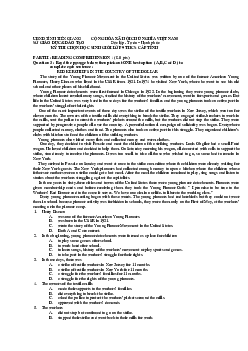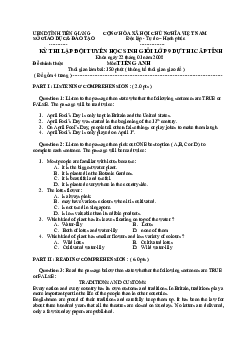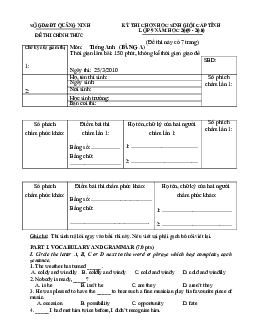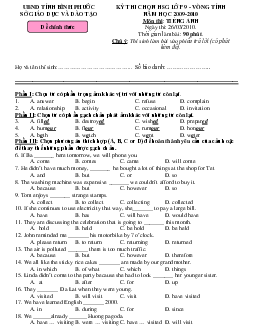








Preview text:
SỞ GIÁO DỤC VÀ ĐÀO TẠO
KÌ THI CHỌN HỌC SINH GIỎI CẤP TỈNH THCS NĂM 2021 TỈNH QUẢNG NINH
Môn thi: TIẾNG ANH - Bảng A Ngày thi: 20/3/2021 ĐỀ THI CHÍNH THỨC
Thời gian làm bài: 150 phút, không kể thời gian giao đề
(Đề thi này có 08 trang, không kể trang này) Giám thị số 1: Họ, tên và chữ ký Giám thị số 2: Họ, tên thí sinh: SỐ BÁO DANH Ngày sinh: Nơi sinh: Học sinh trường: Số phách Lớp: Hội đồng coi thi: Điểm bài thi
Họ tên, chữ ký của giám khảo Số phách
Bằng số: .......................................... 1: .............................................................
Bằng chữ: ........................................ 2: ............................................................. Ghi chú:
- Thí sinh trả lời ngay vào bài thi này. Nếu viết sai phải gạch bỏ rồi viết lại.
- Thí sinh không được sử dụng tài liệu, kể cả từ điển. 0
- Giám thị không giải thích gì thêm.
HƯỚNG DẪN PHẦN THI NGHE
Bài nghe gồm 3 phần, mỗi phần thí sinh được nghe 2 lần, mỗi lần cách nhau 05 giây;
mở đầu và kết thúc mỗi phần nghe có tín hiệu.
Mở đầu và kết thúc bài nghe có tín hiệu nhạc.
Mọi hướng dẫn cho thí sinh (bằng Tiếng Anh) đã có trong bài nghe. A. LISTENING: (4.0 points)
Part 1: Listen and complete the notes below with no more ONE WORD AND/OR A
NUMBER for each answer in the numbered boxes provided. (2.0 points)
SOUTH CITY CYCLING CLUB Membership
Full membership costs $260; this covers cycling and (1.) __races__________ all over Australia.
Recreational membership costs $108
Cost of membership includes the club (2.) _____fee_______ and (3.) ____insurance________.
The club kit is made by a company called Jerriz. Training rides
Chance to improve cycling (4.) __skills__________and fitness.
Level B: speed about (5.) ____35________ kph. Weekly sessions.
Tuesday at 5.30 am, meet at the (6.) __stadium__________.
Thursday at 5.30 am, meet at the entrance to the (7.) ___park_________. Further information
Rides are about an hour and a half.
Members often have some (8.) __coffee__________together afterwards.
There is not always a (9.) __leader__________with the group in these rides.
Bikes must have (10.) ___lights_________.
Part 2. Listen to the recording and circle the best answer to each question. (1.0 point)
11. The camping trip will be held_______. A. the following month
B. from the 24th to the 26th C. over a five-day period
12. Jamie’s complaint about last year’s trip was that_______.
A. the camp wasn’t big enough
B. he was unhappy while at the camp
C. he had problems finding the camp
13. The campsite is located________. A. in the Lake District B. in Carlisle C. on lake Brand
14. Jamie thinks the forests will be good for children who________. A. are used to nature B. live in cities C. like sports
15. Each child will pay________. A. less than £4 a night B. approximately £5 C. more than £10
Part 3. You will listen to a short talk about the entertainment program and decide
whether the following statements are true (T) or false (F). (1.0 point) 1
16. Sally cannot reveal the name of the band for the first party. 16._____
17. This event is for all students. 17._____
18. There will be a concert in the Cotswold Theatre on Monday. 18._____
19. There is an important event on Thursday. 19._____
20. There is no formal dress code for the Freshers’ Ball. 20._____
B. GRAMMAR AND LEXICO. (5.0 points)
I. Circle the letter A, B, C or D before the word whose underlined part is pronounced
differently from the others in each group. (0.5 point) 1. A. broad B. load C. road D. boat 2. A. breathe B. mathematics C. southern D. although 3. A. swing B. sweet C. sword D. swan 4. A. extension B. persuasion C. confusion D. explosion 5. A. emergency B. prefer C. operate D. versatile
II. Circle the letter A, B, C or D before the word whose main stress pattern is placed
differently from the others in each group. (0.5 point) 1. A. recipe B. recipient C. recital D. redundant 2. A. exciting B. important C. delicious D. beautiful 3. A. indicator B. monarchy C. longitude D. magnificent 4. A. education B. unhappily C. development D. community 5. A. intentional B. optimistic C. environment D. participant
III. Circle the letter A, B, C or D before the word or phrase that best completes each
sentence or answers each question. (1.5 points)
1. ________ gene in the human genome to be thoroughly understood, many human diseases could be cured or prevented. A. Each B. Since C. If each D. Were each
2. The spokesperson would not ________ any further on such a sensitive matter. A. hint B. elaborate C. quote D. disclose
3. There’s been an accident on the motorway, so there’s a big ________. A. hold-up B. hold-on C. hold-off D. uphold
4. Only during the early 20th century ________ in the United State.
A. liquor was prohibited then C. was liquor prohibited B. that liquor was prohibited D. when liquor was prohibited
5. Professor Alan insisted that every student ________ the report by Friday. A. finish B. finishes C. finished D. had finished
6. It took me 10 years to ________ enough money to travel around the country. A. set out B. put away C. put by D. save aside
7. “So long!” is another way of saying ________. A. Hello! B. Cheer up! C. I’m very happy. D. Goodbye!
8. “– Hello, I’d like to speak to Mr Green, please.”- “________”.
A. I’m afraid I don’t know.
C. Sorry. Can you take a message?
B. I’m sorry. I’ll call again later.
D. Sure, I’ll put you through.
9. They are happily married although, of course they argue _______. A. most times C. every now and then B. from day to day D. on the occasion
10. It was hard to _______ the temptation to watch the late night show though I was so tired. 2 A. defy B. refuse C. resist D. oppose
11. If you want a flat in the centre of the city, you have to pay through the ______ for it. A. teeth B. back of your head C. nose D. arm
12. He is the first student ______ the scholarship this year. A. who win B. to win C. winning D. whose won
13. Tet is a wonderful opportunity for ______ off new clothes. A. showing B. wearing C. carrying D. putting
14. ______ in large quantities in the Middle East, oil became known as black gold because of the large profit it brought. A. Discovering C. Discovered B. Which was discovered D. That when discovered
15. Sally has an _____ command of the French language. A. extreme B. utter C. outstanding D. intensive
IV. Circle the letter A, B, C or D under the underlined word/ phrase in each sentence
that needs correcting, then correct it. (1.0 point)
1. The amount of women earning Master’s degree has risen sharply in recent years. A B C D
2. Some methods to prevent soil erosion are ploughing parallel with the slopes of hills, A B
to plant trees on unproductive land, and rotating crops. C D
3. Only after Theodore Roosevelt became president did conservation developed into a major A B C
environmental issue in the United States. D
4. Albert Einstein was such brilliant a scientist that many of his colleagues had to study for A B C
several years in order to form opinions about his theories. D
5. Urbanization is relevant to a range of disciplines, including urban planning geography, A B
sociology, economic and public health. C D Mistake Correction Mistake Correction 1. 4. 2. 5. 3.
V. Use the word in capitals at the end of each of the following sentences to form a word
that fits suitably in the blank. (1.0 point)
1. Despite the star-studded cast, the film was only ___________ successful. PART
2. An increasing number of private kindergartens have mushroomed to SCHOOL
meet increasing demands for __________________education.
3. Your good result will make your parents ________________ proud of you. MEASURE
4. The main_____________ problem was to rebuild the destroyed cities and 3 industries. WAR
5. Linda has a rapid __________________ from her illness. RECOVER
6. Dragons are just Asian _________________ and legendary animals. IMAGINE
7. My sister is the person who I always have sibling __________________. RIVAL
8. It is astonishing that these criminals are free to walk on the streets with ____________________. PUNISH
9. Some people claim to be able to __________________the future. TELL
10. Young people are very ______________and shouldn’t be allowed to IMPRESS watch violent movies.
VI. Fill in the gaps the most suitable preposition or particle. (0.5 point)
1. You look tired. Are you___________ the weather?
2. They plan to blow ___________that old building because it's unsafe.
3. There were no ripe apples ___________reach, so I moved the ladder.
4. What do you get if you divide 22 ___________7? A complicated number.
5. Don’t eat that sausage. I think it’s gone ___________. C. READING: (6.0 points)
I. Read the following passage and circle the letter A, B, C or D to indicate the correct
word(s) to each of the questions. (2.0 points)
When a work project offered me the opportunity to return to New Zealand, I spent
several weeks (1) _______ a country I had left in my early twenties. I’d forgotten about the
petrol stations where men in smart uniforms (2) _______ to you. They fill your tank, check
your oil and still charge you less than one third of the British price for fuel. And the people
rush to your assistance if they see you (3) _______over a map or the blissful absence of tips.
Locals simply cannot understand why anybody should expect to (4) _______extra for friendly efficient service.
Given that New Zealand has about 3,000 kilometers of coastline, it should come as no
(5) _______that social life (6)_______ around the sea. When Auckland office workers leave
their desks at the end of the working day, they don’t (7) _______ home. Instead, they
(8)_______ a beeline for the marina and spend the evening (9)_______ sail on the Hauraki
Gulf. There are more yachts in Auckland than in any other city in the world- no wonder it’s
called the City of Sails. Even those who can’t afford a vessel of their own will always know
someone who has one, or at the (10) _______ least, will windsurf the offshore breezes at
speeds that make the commuter ferries appear to stand still. 1. A. regaining B. recapturing C. refamiliarising D. rediscovering 2. A. assist B. attend C. supply D. serve 3. A. pointing B. doubting C. clamouring D. puzzling 4. A. pay B. take C. have D. get 5. A. wonder B. surprise C. amazement D. news 6. A. centers B. revolves C. turns D. gathers 7. A. move B. aim C. head D. divert 8. A. have B. do C. get D. make 9. A. under B. by C. with D. on 10. A. simple B. single C. utmost D. very
II. Fill in each numbered blank in the following passage with ONE suitable word. (2.0 points)
Illiteracy is the condition of being (1) _____________ to read and write. Illiteracy
is also (2) _____________ to describe the condition of being ignorant or unknowledgeable
in a particular subject or field. Computer illiteracy is the inability to use a computer 4 programming language.
Most of us (3) _____________ use computers know how to send emails, or how to
create a new folder. But we know (4) _____________ about programming languages, the
artificial languages used to write instructions that can be executed by a computer. Even in
technologically (5) _____________ countries, a very small percentage of computer users are
able to read or write this kind of computer language. Should we (6) _____________ the
effort to learn a computer language, especially when these are so complicated? The answer
is yes. Because of computer illiteracy, users are at the (7) _____________ of software
manufacturers. Our society becomes more dependent on information technology and in a
few years’ (8) _________________, reading and writing a computer language will be as
essential (9) _____________ using a human language. Computer users will not be able to
survive (10) _____________ they know the code - the set of detailed instructions that tell a
computer what to do. In the future, survival and professional success will presuppose knowing
everything about the machines we work with.
III. Read the following passage and circle the letter A, B, C or D to indicate the correct
answer to each of the questions. (2.0 points)
Among all the abilities with which an individual may be endowed, musical talent
appears earliest in life. Very young children can exhibit musical precocity for different
reasons. Some develop exceptional skills as a result of a well-designed instructional regime,
such as the Suzuki method for the violin. Some have a good fortune to be born into a musical
family in a household filled with music. In a number of interesting cases, musical talent is
part of an otherwise disabling condition such as autism or mental retardation. A musically
gifted child has an inborn talent; however, the extent to which the talent is expressed
publicly will depend upon the environment in which the child lives.
Musically gifted children master at an early age the principal elements of music, 11
including pitch and rhythm. Pitch – or – melody – is more central cultures, for example, in
Eastern societies that make use of tiny quarter – tone interval… Rhythm, sounds produced at
certain auditory frequencies and grouped according to a prescribed system, is emphasized in
sub – Saharan African, where the rhythmic ratios can be very complex.
All children have some aptitude for making music. During infancy, normal children
sing as well as babble, and they can produce individual sounds and sounds patterns. Infants
as young as two months can match their mother’s songs in pitch, loudness, and melodic
shape, and infants at four months can match rhythmic structure as well. Infants are especially
predisposed to acquire these core aspects of music, and they can also engage in sound play
that clearly exhibits creativity.
Individual differences begin to merge in young children as they learn to sing. Some
children can match large segments of a song by the age of two or three. Many others can only
approximate pitch at this age and may still have difficulty in producing accurate melodies by
the age of five or six. However, by the time they reach school age, most children in any
culture have a schema of what a song should be like and can produce a reasonably accurate
imitation of the songs commonly heard in their environment.
The early appearance of superior musical ability in some children providences that
musical talent may be a separate and unique form of intelligence. There are numerous tales of
young artists who have a remarkable “ear” or extraordinary memory for music and a natural
understanding of musical structure. In many of these cases, the child is average in every other
way but displays an exceptional ability in music. Even the most gifted child, however, takes
about ten years to achieve the levels of performance or composition that would constitute
mastery of the musical sphere. 5
Every generation in music history has its famous prodigies – individuals with
exceptional musical powers that emerge at a young age. In the eighteenth century, Wolfgang
Amadeus Mozart began composing and performing at the age of six. As a child, Mozart
could play the piano like an adult. He had perfect pitch, and at the age of nine, he was also a
master of the art of modulation – transitions from one key to another – which became one of
the hallmarks of his style. By the age of eleven, he had composed three symphonies and 30
other major works. Mozart’s well – developed talent was preserved into adulthood.
Unusual musical ability is a regular characteristic of certain anomalies such as autism.
In one case, an autistic girl was able to play “Happy birthday” in the style of various
composers, including Mozart, Beethoven, Verdi, and Schubert. When the girl was three, her
mother called her by playing incomplete melodies, which the child would complete with the
appropriate tone in the proper octave. For the autistic child, music maybe the primary mode
of communication, and the child may cling to music because it represents as a haven in a
world that is largely confusing and frightening.
1. The word “precocity” in paragraph 1 is closest in meaning to______. A. strong interest B. talent C. advanced skill D. personal style
2. Which sentence below best expresses the essential information in the italicized sentence in paragraph 1?
A. Children may be born with superior musical ability, but their environment will
determine how this ability is developed.
B. Every child is naturally gifted, and it is the responsibility of the public schools to
recognize and develop these talents.
C. Children with exceptional musical talent will look for the best way to express
themselves through music – making.
D. Some musically talented children live in an environment surrounded by music,
while others have little exposure to music.
3. The author makes the point that musical elements such as pitch and rhythm______.
A. distinguish music from other art forms B. vary in emphasis in different cultures
C. make music difficult to learn
D. express different human emotions
4. The word “predisposed” in paragraph 3 is closest in meaning to______. A. inclined B. gifted C. pushed D. amused
5. According to the passage, when does musical talent usually begin to appear?
A. When infants start to babble and produce sound patterns.
B. Between the ages of two and four months.
C. When children learn to sing at two or three years old.
D. Between ten years old and adolescence.
6. According to the passage, which of the following suggests that musical talent is the
separate form of intelligence?
A. Exceptional musical ability in an otherwise average child.
B. Recognition of the emotional power of music.
C. The ability of all babies to acquire core elements of music.
D. Differences between learning music and learning language.
7. Why does the author discuss Mozart in paragraph 6?
A. To compare past and present views of musical talent.
B. To give an example of a well- known musical prodigy.
C. To list musical accomplishments of the eighteenth century.
D. To describe the development of individual musical skill.
8. In music, the change from one key to another is known as______. A. rhythm B. prodigy C. perfect pitch D. modulation
9. The word “haven” in paragraph 7 is closest in meaning to______. 6 A. beautiful art B. safe place C. personal goal D. simple problem
10. Which of the followings can be inferred from the passage about exceptional musical ability?
A. It occurs more frequently in some cultures than in others.
B. It is evidence of a superior level of intelligence in other areas.
C. It has been documented and studied but is little understood.
D. It is the result of natural talent and a supportive environment. D. WRITING (5.0 points)
I. Finish each of the following sentences in such a way that it means exactly the same as
the sentence printed before it. (1.6 points)
1. Keeping calm is the secret of passing your driving test.
As long as_______________________________________________________________
2. I was strongly determined to complete my assignment before the end of the month.
I had____________________________________________________________________
3. It was only when I left home that I realized how much my family meant to me.
Not until ________________________________________________________________
4. You have disobeyed; you will therefore be punished.
As a result _______________________________________________________________
5. My bank manager and I get on together very well.
I am on__________________________________________________________________
6. Something must be done quickly to solve the problem of homelessness.
Urgent action _____________________________________________________________
7. We were surprised to learn that Brian had become a monk.
It came ________________________________________________________________
8. I am sure he didn’t know that his mother was seriously ill.
He couldn’t possibly _______________________________________________________
II. Complete the 2nd sentence so that it has a similar meaning to the first sentence, using
the word given. Do not change the word given. You must use between two and five words.(1.4 points)
1. Clara said that she had not seen the missing letter. (having)
Clara _______denied having seen____________________________________ the missing letter.
2. Everyone who spoke to the victim is a suspect. (under) Everyone who spoke to the victim _is under
suspicion__________________________________________
3. You must never let anyone use your identity card. (should)
Under __________no circumstances__________________________ let anyone else use your identity card.
4. Those two makes of car are practically the same. (hardly) There are_____hardly any differents
between____________________________________ those two makes of car.
5. I will never forget to consider Darren’s views when I make a decision again. (account)
That’s the last time I forget to_____take into account Darren’s
view________________________ when I make a decision. 7
6. Sean, do you know yet what you’re doing this evening? (mind)
Sean, have______made up you mind_____________________________ yet what you’re doing this evening?
7. My grandfather had completely forgotten that he phoned me last night.(recollection)
My grandfather didn’t have any ___recollection of having phoned
______________________________ me last night.
III. Write a paragraph (about 180 words) to give your opinion about the importance of self-study. (2.0 points)
…………………………………………………………………………………………….…….
…………………………………………………………………………………………….…….
…………………………………………………………………………………………….…….
…………………………………………………………………………………………….…….
…………………………………………………………………………………………….…….
…………………………………………………………………………………………….…….
…………………………………………………………………………………………….…….
……………………………………………………………………………………………….…
…………………………………………………………………………………………….…….
…………………………………………………………………………………………….…….
…………………………………………………………………………………………….…….
…………………………………………………………………………………………….…….
…………………………………………………………………………………………….…….
…………………………………………………………………………………………….…….
……………………………………………………………………………………………….…
…………………………………………………………………………………………….…….
…………………………………………………………………………………………….…….
…………………………………………………………………………………………….…….
…………………………………………………………………………………………….…….
…………………………………………………………………………………………….…….
…………………………………………………………………………………………….…….
…………………………………………………………………………………………….…….
……………………………………………………………………………………………….…
…………………………………………………………………………………………….…….
…………………………………………………………………………………………….…….
…………………………………………………………………………………………….……. ___THE END___ 8




